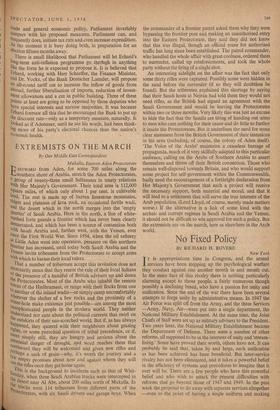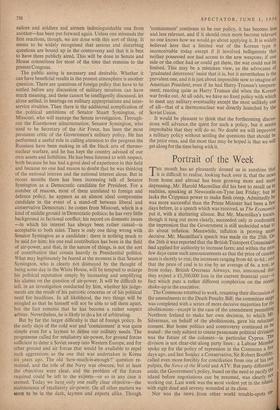No Fixed Policy
BY RICHARD H. ROVERE New York IT is appropriations time in Congress, and the armed services have been stepping up the psychological warfare they conduct against one another month in and month out. In the mere fact of this rivalry there is nothing particularly alarming except to those people, a fairly numerous though possibly a declining breed, who have a passion for unity and unification. Since the end of the war there have been several attempts to forge unity by administrative means. In 1947 the Air Force was split off from the Army, and the three Services —Army, Navy, Air—were put into a single department, the National Military Establishment. At the same time, the Joint Chiefs of Staff were set up as military advisers to .the President. Two years later, the National Military Establishment became the Department of Defense. There were a number of other reforms, all supposed to be in the interests of unity and 'stream- lining.' Some have proved their worth, others have not. It can probably be said that, taken by and large, such unification as has been achieved has been beneficial. But inter-service rivalry has not been eliminated, and it takes a powerful belief in the efficiency of systems and procedures to imagine that it over will he. There are a few people who have this powerful belief and who wish to attack the present difficulties with reforms that go beyond those of 1947 and 1949. In the past week the proposal to do away with separate services altogether —even to the point of having a single uniform and making sailors and soldiers and airmen indistinguishable one from another—has been put forward again. Unless one misreads the first reactions, though, we are done with this sort of thing. It seems to be widely recognised that serious and disturbing questions are bound up in the controversy and that it is best to have them publicly aired. This will be done in Senate and House committees for most of the time that remains to the present Congress.
The public airing is necessary and desirable. Whether it can have beneficial results in the present atmosphere is another question. There are questions of foreign policy that have to be settled before any discussion of military missions can have much meaning, and theSe cannot be intelligently discussed, let alone settled, in hearings on military appropriations and inter- service rivalries. Then there is the additional complication of the political ambitions of Senator Stuart Symington, of Missouri, who will manage the Senate investigation. Through- out the Eisenhower administration; Senator Symington, who used to be Secretary of the Air Force, has been the most persistent critic of the Government's military policy. He has performed a useful role in calling attention to the progress the Russians have been making in all the black arts of thermo- nuclear warfare, and he has kept the country advised of our own assets and liabilities. He has been listened to with respect, both because he has had a,good deal of experience in this field ' and because no one had reason to doubt that he was thinking of the national interest and the national interest alone. But in recent months there has been increasing talk of Senator Symington as a Democratic candidate for President. For a number of reasons, most of, them unrelated to foreign and defence policy, he appears as an almost ideal compromise candidate in the event of a stand-off between liberal and conservative Democrats : he comes from Missouri, which is a kind of middle ground in Democratic politics; he has very little background in factional conflict; his record on domestic issues —in which his interest has always been rather casual—is acceptable .to both sides. There is only one thing wrong with Senator Symington as a candidate : there is nothing much to be said for him; his one real contribution has been in the field of air-power, and that, in the nature of things, is not the sort of contribution that counts heavily in Presidential politics. What may legitimately be feared at the moment is that Senator Symington, who is clearly hot dismayed by the thought of being some day in the White House, will be tempted to enlarge his political reputation simply by increasing and amplifying his alarms on the question of air-power. It will be difficult to tell, in an investigation conducted by him, whether his judge- ments are the result of his patriotic concerns or of his political need for headlines. In all likelihood, the two things Will be mingled so that he himself will not be able to tell them apart, but the fact remains that he has become a rather suspeCt arbiter. Nevertheless, he is likely to do a lot of arbitrating.
But by far the larger difficulty is that of foreign policy. In the early days of the cold war and `containment' it was quite simple even for a layman to define our military needs. The programme called for retaliatory air-power, for ground forces sufficient to deter a Soviet sweep into Western Europe, and for other ground and air forces that would be available to repel such aggressions as the one that was undertaken in Korea six years ago. The old 'how-much'-is-enough?' question re- mained, and the role of the Navy was obscure, but at least the objectives were clear, and the 'problem of the forces required could be left to the experts--or so in any case it seemed. Today we have only one really clear objective—the maintenance of retaliatory air-power. On all other matters we seem to be in the dark, laymen and experts alike. Though `containment' continues to be our policy, it has become less and less relevant, and if it should once more become relevant no one knows how we would go about applying it. It is widely believed here that a limited war of the Korean type is inconceivable today except if it involved belligerents that neither possessed nor had access to the new weapons; if one side or the other had or could get them, the war could not be limited. This may be a mistaken view, as the advocates of `graduated deterrence' insist that it is, but it nevertheless is the prevalent one, and it is just about impossible now to imagine an American President, even if he had Harry Truman's tempera- ment, reacting quite as Harry Truman did when the Korean war broke out. At all odds, we have no fixed policy with which to meet any military eventuality except the most unlikely one of all—that of a thermonuclear war directly launched by the Soviet Union.
It would be pleasant to think that the forthcoming discus- sions will advance the quest for such a policy, but it seems improbable that they will do so. No doubt we will improvise a military policy without settling the questions that should be the prior ones, and the most that may be hoped is that we will get along for the time being with it.



































 Previous page
Previous page